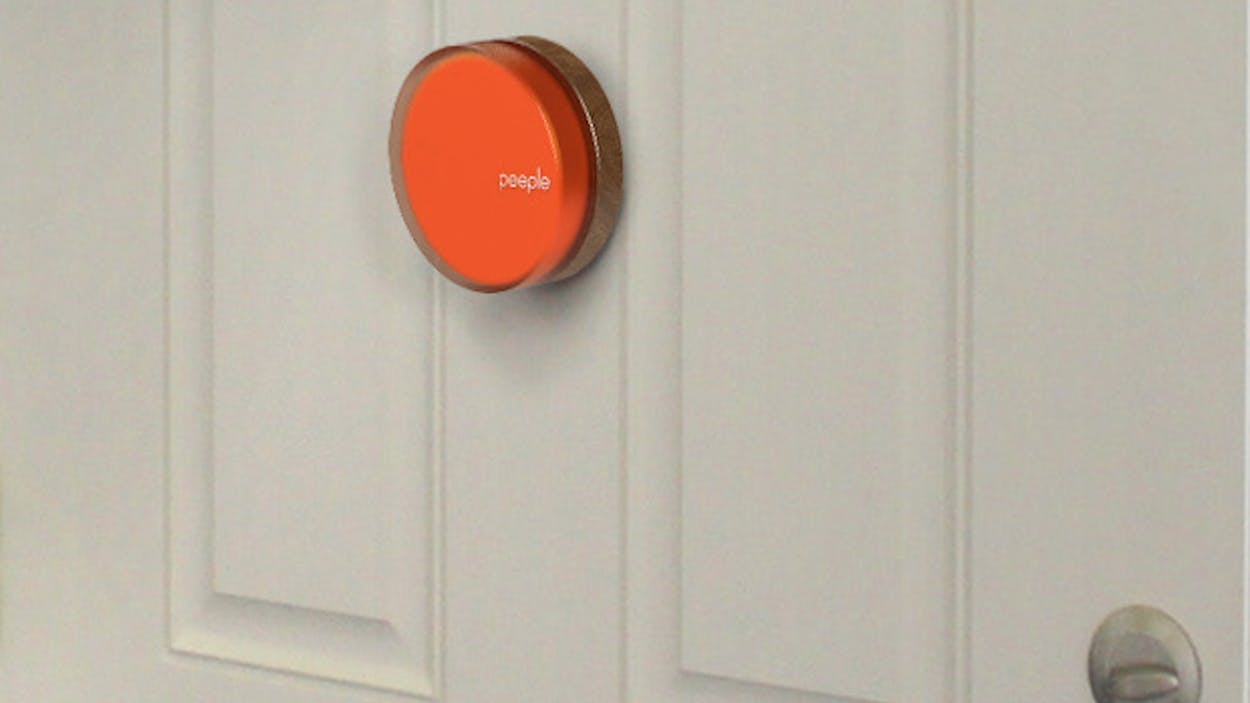A few years ago, Chris Chuter’s three-year-old son walked out of the front door. A neighbor saw him and brought him back home before he reached any dangerous intersections, but Chuter realized at that moment that he needed a better way to track what was happening at his door. So he created a device that would tell him. It was a smart camera that connected to the peephole in his door and sent his phone a photo of who was at his door every time it opened or closed or whenever someone knocked.
“It was like caller ID,” Chuter says. He decided to launch a company around the device, and he had a good idea what he wanted to call it: Peep. But then he did a trademark search—the name was taken by a porn company. So instead, he filed a trademark for the name Peeple. “It was great. Whenever someone said it, it sounded like ‘peephole,'” he recalls. “It was perfect.”
It’s less perfect now, for reasons that are decidedly weird. Chuter’s currently in London, where he just won the 2015 JLAB competition and the £100,000 prize that comes with it. But that accomplishment has been overshadowed by another company called Peeple that has been making headlines the past few days. This one—a service that promises to be like Yelp, but for every single person you encounter—is way more contentious than a camera in your door that tells you who knocked.
The Washington Post called the new Peeple “terrifying” and “a terrible idea,” while Fortune declared it “truly awful.” The headlines are only the tip of the iceberg, too: The #Peeple hashtag on Twitter has been exploding for more than twenty-four hours as people rail against the service.
There are plenty of reasons to be terrified of an app like Peeple. It’s already pretty easy to bully, harass, and threaten people online, but the way Peeple is set up makes it even easier: Users don’t have to sign up for the site, they can be signed up by others, and once they’re on, there’s no way to get off. All anyone needs to sign you up for the site is your phone number—and once Peeple has it, they promise to send you text updates every time you’re reviewed. If that sounds terrifying to you when you think about your unpleasant interaction while you were in your mechanic’s waiting room, well, imagine what it must be like for a teenager.
Chuter has been on the receiving end of misplaced outrage over the Yelp-like Peeple over the past few days. And even though he’s clearly very frustrated by what’s been happening to the name he’s built, he’s learned what it’s like to be the subject of the internet’s scorn. “I can empathize with them. They must be getting orders of magnitude of vitriol,” he says of app founders Julia Cordray and Nicole McCullough, who went on Good Morning America Thursday to defend their service. But he’s also learned that, when it comes to receiving unsolicited feedback from strangers on the Internet, those ladies aren’t likely to bear the brunt of it. “About 50 to 70 percent of the Twitter response has been from the gay and transgender community,” Chuter says. “I’m learning a lot that I didn’t expect to.”
The company’s Twitter account has been responding to the steady stream of invective they’ve been receiving (and, also, the support from people who realize the mistaken identity):
@sebbaird Our brand/inbox/twitter is taking it on the chin, but I think we will outlast the imposters. Tell your followers about us!
— peeple (@peeple) October 1, 2015
@mtthwdyr @DrKevGuitar @MattAlgren @Peeple we are a software company that creates peep hole cameras, hence the phonetic spelling! 🙂
— peeple (@peeple) October 1, 2015
@meanhood We are a smart home technology and not associated with @peepleforpeeple. Check us out http://t.co/kRvBHlamGk! We are the original
— peeple (@peeple) October 1, 2015
@Ceilidhann Haha, yes, but we launched in January of 2015! http://t.co/1lQmWREbWu
— peeple (@peeple) October 1, 2015
Chuter is clear that his company owns the trademark—the app-based service does not—though he does note that the other Peeple did file an application around the same time that he did, but in Canada. That could potentially lead to some complicated legal issues if he has to sue (“We’re dealing with treaties,” he says), but he’s hopeful that he won’t have to. “As a start-up, I don’t want to spend money on lawyers right now,” he says. “But we’re not changing the name. We have an intent-to-use trademark.”
Although the other Peeple may have had a similar name in mind back when both companies applied to register, only one has actually received the trademark—and Chuter has been using his for the better part of a year. (He raised $90,000 in a Kickstarter campaign in May.) It’s hard to imagine that Cordray and McCullough didn’t even search “peeple” on Google before announcing their company this week, which makes it seem more likely that, perhaps, they just didn’t care that someone else was already in business using that name.
For his part, Chuter hasn’t spoken with or met the app’s founders, but he learned about its existence a few days before it became fuel for Twitter venom. “Nine days ago, I got an email from someone who had mistaken us after he saw an article in the Canadian press. He went on a small rant, but was very nice—like the nice version of everything you’ve seen on Twitter. I thought to myself, ‘This isn’t a big deal if this is all the press it gets,'” he recalls. “But if the media picks this up, this is gonna be a pain in the *ss.”
It certainly appears to have been that, but Chuter is trying to remain hopeful. “We’re trying to put the best spin on it that we can,” he says. “A lot of people are finding out about us, which is good. I think this will all blow over.”








